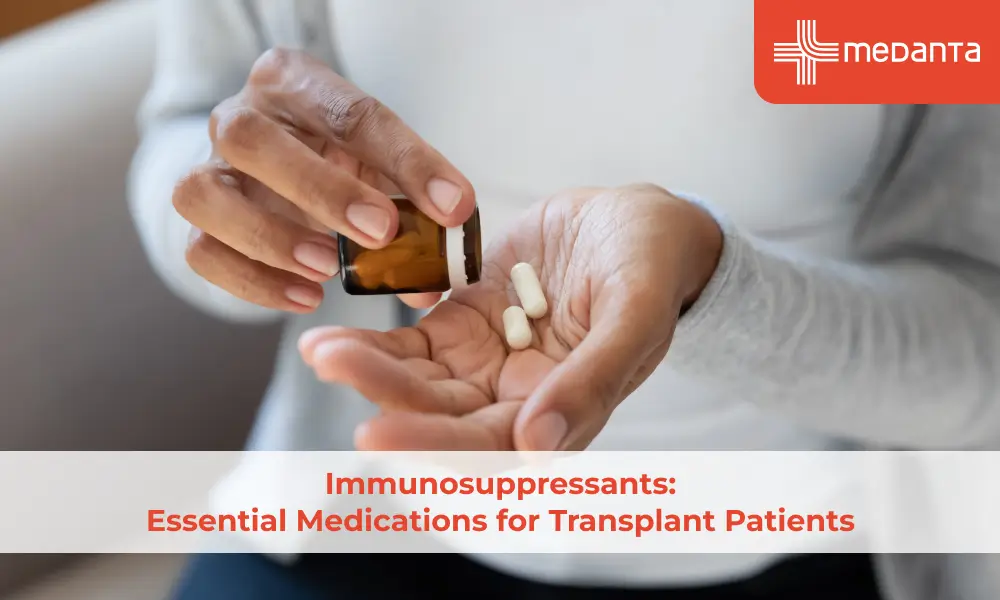Immunosuppressants: Essential Medications for Transplant Patients

TABLE OF CONTENTS
- What Are Immunosuppressants?
- Why Are They Needed After Transplants?
- Common Types of Immunosuppressant Drugs
- How These Medications Work in the Body
- Side Effects and Long-term Risks
- Importance of Dosage and Monitoring
- Infection Prevention While on Medication
- Living a Healthy Life on Immunosuppressants
- Conclusion
- FAQs
Most people look for immunity booster foods to strengthen their body's defences. Transplant patients face a unique challenge - they need to do just the opposite.
Your body fights off sickness better with a strong immune system. A well-balanced diet rich in nutritious foods serves as our best defence against chronic conditions like heart disease and diabetes. These foods provide immune-boosting vitamins, minerals and antioxidants. But transplant patients see this natural immune response as a serious threat.
The human body excels at detecting what belongs and what doesn't. It launches an attack after spotting something foreign, like a newly transplanted organ. This makes immunosuppressants true lifesavers. These powerful medications stop the body from rejecting the transplanted organ. They reduce the same immune responses that vitamin C helps strengthen.
Let me walk you through the critical world of immunosuppressants for transplant patients in this article. You will understand about these medications and why patients need them after transplants. We will also cover ways to handle side effects and stay healthy while taking these medications. The piece answers common questions about living with immunosuppressants.
What Are Immunosuppressants?
Immunosuppressants are strong medicines that lower your immune system's strength. These medications target specific parts of your immune response to stop it from attacking healthy tissue. While immunity-boosting foods make your defences stronger these medications deliberately reduce certain immune responses.
Why Are They Needed After Transplants?
Your immune system treats a new organ like a foreign invader, much like bacteria or viruses. Your body would reject the transplant naturally without help. Immunosuppressants prevent rejection by making your immune system accept the new organ as its own.
Common Types of Immunosuppressant Drugs
Main types of immunosuppressants are:
Calcineurin inhibitors like tacrolimus
Antimetabolites such as mycophenolate
Corticosteroids like prednisone
Newer targeted therapies
Transplant patients usually take several of these medicines together. Each type controls the immune response differently while letting you fight infections.
These medications might seem opposite to immunity boosting foods, but they share a common purpose: keeping your immune system balanced and healthy.
How These Medications Work in the Body
Immunosuppressants target specific parts of your immune response.
Calcineurin inhibitors like tacrolimus stop signals that activate T-cells.
Antimetabolites such as mycophenolate stop cell division by blocking purine synthesis.
mTOR inhibitors (sirolimus) prevent growth factor signals.
Corticosteroids decrease inflammation and immune cell activity.
These drugs work together, and each one targets a different pathway.
Side Effects and Long-term Risks
These medications can increase your risk of infections and certain cancers, especially skin cancers and lymphomas.
Calcineurin inhibitors often cause nephrotoxicity.
People are more prone to metabolic problems like diabetes, hypertension, and high cholesterol.
Your bone marrow might become suppressed, which leads to lower blood cell counts.

Importance of Dosage and Monitoring
These medications need precise dosing—too little won't stop rejection while too much causes toxicity. Your blood tests must happen regularly to check drug levels and adjust doses. Doctors need to monitor whole blood concentration for cyclosporine, tacrolimus, and sirolimus.
Infection Prevention While on Medication
You should:
Wash your hands often and stay away from sick people.
Get all but one of these vaccinations - skip the live ones.
Wear masks when you are in crowds.
Make sure you tell your doctors about your immunosuppressed status before any dental or medical procedures.
Living a Healthy Life on Immunosuppressants
Choose foods with plenty of fibre, vitamins and minerals—not the typical immunity boosters but ones that help your overall health.
You can manage stress through meditation or yoga.
Your body needs enough sleep to heal properly.
Never skip your scheduled medical appointments and blood tests.
Conclusion
Immunosuppressants serve as vital lifelines that protect the precious gift of transplantation. Immunosuppressive medicines work in different ways to help your body accept a transplanted organ. As a recipient, regular blood tests, frequent medical checkups and precise dose adjustments become part of daily life. Finding the balance to stop rejection but still keep the immune system working needs constant medical support and close attention.
Living with immunosuppressants comes with various challenges. The side effects can be minor discomfort or turn into major health problems, while the risk of infections stays ever-present. Still, patients demonstrate great resilience as they adjust to their new way of life.
These medications have turned a medical impossibility into reality.
Starting life with immunosuppressants might feel overwhelming initially. Knowledge makes a powerful ally. Understanding these medications' functions and proper self-care strategies helps direct patients through transplant life's complexities. Medical teams stand ready to support patients and adjust treatments when needed.
A successful post-transplant life embraces both the gift and its responsibilities. Your journey may not look like anyone else's, but it leads to the same destination—a life filled with opportunities. This special connection to immunity becomes a chapter in your story and opens the door to everything that can be achieved.
FAQs
Why are immunosuppressants necessary after a transplant?
Your body needs immunosuppressants to prevent rejection of the transplanted organ. The immune system would naturally attack the new organ, just like it fights bacteria or viruses, without these medications. The natural rejection process needs suppression to keep your donated organ working well. Your immune system simply does its job: protecting you from anything it sees as a harmful invader. The life-saving transplant falls into this category, unfortunately.
Do immunosuppressants weaken all immune defences?
These medications don't shut down your entire immune system. They target specific immune pathways while other defences stay active. However, your overall immunity becomes weaker, which makes you more likely to get certain infections and cancers. Immunity booster foods strengthen your whole defence system, but immunosuppressants create a delicate balance. This balance lets your body accept the transplanted organ while keeping some power to fight infections.
What are common side effects of these drugs?
Different medications cause different side effects. Some common side effects are:
Diabetes
High cholesterol levels
Higher infection risk
Increased cancer risk - especially skin cancers
Patients might also experience tremors, hair changes, weight gain, stomach issues like diarrhoea, and kidney problems.
How long do transplant patients take immunosuppressants?
Most transplant patients need these medications throughout their transplanted organ's life. Your body won't suddenly "accept" the organ without medication. Rejection and organ failure usually happen when patients stop taking these medicines, even years after transplantation. Some doctors might lower doses as rejection risk decreases over time.
Can I get vaccinated while on immunosuppressants?
Vaccines are possible but come with important limits. Non-live vaccines like flu shots stay safe, though they might not work as well. Live vaccines such as MMR or chickenpox should be avoided since they could cause infection in people with suppressed immune systems. The timing of vaccines matters - doctors prefer giving them before transplantation or adjust them based on your current medication schedule.


